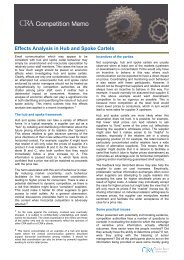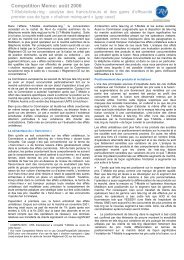CUSTOMER AGREED REMUNERATION - CRA International
CUSTOMER AGREED REMUNERATION - CRA International
CUSTOMER AGREED REMUNERATION - CRA International
You also want an ePaper? Increase the reach of your titles
YUMPU automatically turns print PDFs into web optimized ePapers that Google loves.
<strong>CUSTOMER</strong> <strong>AGREED</strong> <strong>REMUNERATION</strong><br />
offer products of this type, they will remain focused on single premium investment<br />
products.<br />
In order to determine where CAR could bring benefits there are a number of important<br />
issues to take into account. It is clear from the evidence from consumers that given<br />
the complexities of the retail financial services market, consumers would favour a<br />
simple system applied to all products and all types of adviser. However, there are<br />
strong arguments indicating that CAR is more appropriate in some parts of the market<br />
than in others, including:<br />
• The mechanics of applying CAR: the application of the CAR model for single<br />
premium products is simpler than regular premium products.<br />
• Evidence regarding provider bias: Previous research by <strong>CRA</strong> found that provider<br />
bias is most problematic for single premium products rather than regular<br />
premium products.<br />
• Evidence regarding product bias: Previous research by <strong>CRA</strong> found that product<br />
bias is more problematic for the IFA channel than for the tied channel.<br />
In retail investment products, the great majority of the value of investments are<br />
structured as single premiums but, given the potential for substitution between regular<br />
and single premiums, our evidence supports the application of CAR to all retail<br />
investment products irrespective of the premium type. The difficulty of applying CAR to<br />
small regular premium products without factoring, however, suggests that caution is<br />
required regarding the potential application to protection products.<br />
Issues regarding the application to different types of intermediary appear more<br />
straightforward. One of the advantages of CAR is that consumers will be made aware<br />
that the cost of advice has implications for the price of the overall product i.e. that<br />
advice is not free. Despite negotiation over the cost of advice being unlikely in the<br />
short run in any channel, in most parts of the tied channel it is difficult for consumers<br />
to distinguish between the provider and the adviser – especially in the banking channel<br />
– and hence it may never be possible for the consumer to negotiate with the adviser. 1<br />
Furthermore, the incentives faced by advisers in the tied channel are not directly<br />
related to the cost of advice that is, or would be, disclosed. Hence CAR would not, in<br />
itself, remove the potential for product bias. Finally, it is unclear that tied providers<br />
can differentiate between consumers who want ongoing advice and those who do not.<br />
Thus there is reason to be sceptical that CAR can bring clarity to the role of, and<br />
payment for, ongoing advice in the tied channel.<br />
Our research also found differences in consumer perception regarding tied advisers<br />
associated to banks and insurance salesforces. When asked, many consumers see<br />
advisers within banks as performing a sales function and are less concerned regarding<br />
how they are remunerated. Consumers are less likely to suggest the application of CAR<br />
to the insurance tied channel compared to the bank tied channel.<br />
1 Consumers did not identify as a distinct group advisers operating as a separate business with a single tie.<br />
These advisers may face remuneration structures similar to IFAs, but evidence regarding consumer reaction<br />
to these advisers is not available and hence strong conclusions about them can not be drawn.<br />
5




